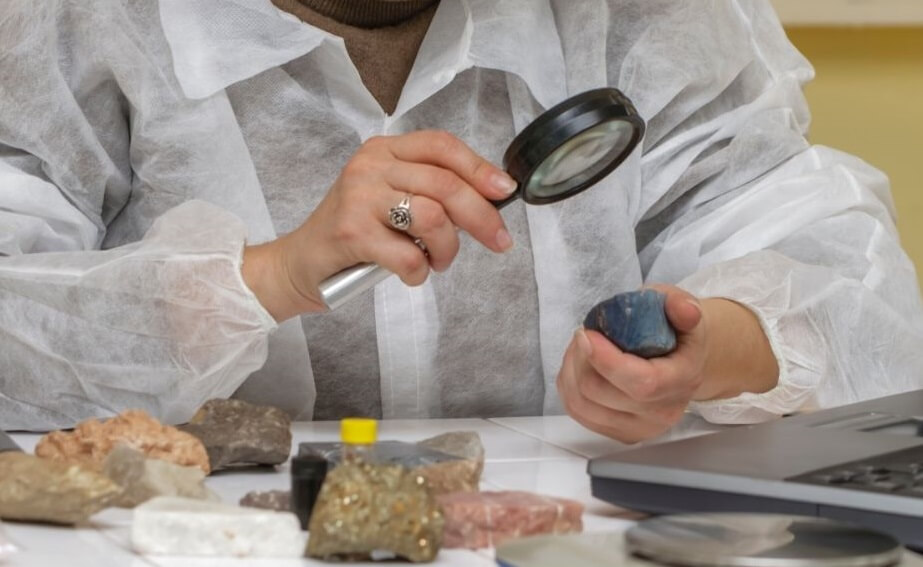What Are the Main Types of Geologists?
To become a geologist, you are generally expected to have completed a degree and have some practical experience in the field. Geologists study the composition, structure and history of the Earth. Their work is fundamental in understanding natural resources and environmental changes and helps predict and mitigate potential natural hazards. Depending on their field of expertise, geologists can work in different areas of Earth science. Here are the main kinds of geologists:
- Environmental Geologist: Environmental geologists study the processes that shape the Earth’s surfaces by analysing natural processes such as erosion and flooding and modelling their effects on the landscape. They also focus on pollution control and waste management and often work on land-use projects related to environmental sustainability.
- Engineering Geologist: Engineering geologists provide expertise to the construction and civil engineering teams about ground conditions. They study and map soil, rock, and other earth materials used for building and help ensure sites for towers, bridges, tunnels, and dams are stable and safe.
- Petroleum Geologist: A petroleum geologist investigates subsurface rock formations, seismic data, and structures to evaluate the probability of underground oil and gas reservoirs and where to drill.
- Hydrogeologist: Hydrogeologists study the distribution and flow of groundwater, determine water quality, manage water resources, and assess the impact of human activities on aquifers and water supplies, which are crucial to mitigating water scarcity and pollution.
- Mining geologist: Mining geologists are involved in exploring and extracting minerals and ores. They locate mineral deposits, evaluate the potential for their commercial viability, and oversee mining operations to extract the minerals efficiently and safely.
- Marine geologist: Marine geologists look at the geology of the sea floor. They map underwater features such as volcanoes, trenches and hydrothermal vents and study the effects of sea-level rise on the continental shelves. They focus on plate tectonics and the sea’s role in global warming.
- Volcanologists: Volcanologists study volcanoes and volcanic activity. They monitor active volcanoes, analyse past eruptions and assess the risk that certain volcanoes will erupt again shortly. Volcanologists are essential in monitoring active volcanoes and warning the communities that live near them.
- Seismologist: Seismologists study earthquakes and the movement of tectonic plates. They use seismic data to estimate the risk of future earthquakes, predict tectonic deformation, and understand the interior of the Earth.
- Paleontologists: Paleontologists study fossils to understand the history of life on Earth. In particular, they study the remains of plants, animals and microorganisms to reconstruct ancient communities and track the evolution of species over time.
- Geochemist: The geochemist examines the proportions of the chemical elements and isotopes in earth materials – rocks, minerals, and groundwater – to provide insights into geological processes and anthropogenic environmental effects.
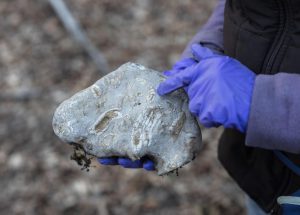
What Does a Geologist Do?
To become a geologist, you study the Earth’s materials, structure, and processes to answer questions about its past, present, and future. Their work is crucial in fields such as natural resource exploration, environmental conservation, and natural disaster prediction. Here’s a detailed breakdown of what a geologist typically does:
- Conduct Fieldwork: To become a geologist, you spend a significant amount of time in the field, collecting rock samples, mapping geological features, and studying landforms. They often travel to remote locations to gather data and observe geological processes firsthand.
- Analyze Geological Data: After collecting samples and data in the field, geologists analyze their findings in a laboratory setting. This may involve studying rock and soil samples under a microscope, conducting chemical tests, or using computer models to interpret geological data.
- Create Geological Maps: To become a geologist, you create detailed maps of the Earth’s surface and subsurface, showing rock formations, fault lines, and other geological features. These maps are used by other professionals, such as engineers and environmental scientists, to make informed decisions about land use, construction, and resource extraction.
- Study Natural Hazards: To become a geologist, you play a key role in assessing the risk of natural hazards, such as earthquakes, landslides, and volcanic eruptions. They use seismic data, geological mapping, and historical records to predict future events and help communities prepare for natural disasters.
- Explore Natural Resources: Many geologists work in resource exploration, searching for valuable materials like oil, gas, minerals, and metals. They analyze geological formations to identify potential resource deposits and assess their commercial viability.
- Monitor Environmental Impact: To become a geologist, you often work on projects related to environmental conservation and sustainability. They study the impact of human activities, such as mining, drilling, and waste disposal, on the Earth’s ecosystems and water resources.
- Write Reports and Present Findings: To become a geologist, you write detailed reports based on their fieldwork and data analysis. These reports are used by government agencies, private companies, and academic institutions to make decisions about resource management, environmental protection, and land development.
- Collaborate with Other Professionals: To become a geologist, you frequently work with engineers, environmental scientists, and policymakers to solve complex problems related to land use, natural resource management, and environmental protection.
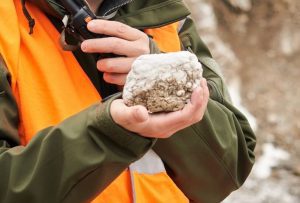
Average Geologist Salary
The salary of a geologist in the UK depends on the person’s working area. If a person has more experience and qualifications, his salary will increase. Here I have to give you an idea about the salary of geologists in the UK. Here’s an overview of the typical geologist’s salary.
- Entry-level geologist: Up to £30,000 per year, working in environmental consulting, mining or oil and gas exploration.
- Mid-Level Geologist: With five to 10 years of experience, mid-level geologists can earn between £30,000 and £45,000 annually. Mid-level geologists will be more responsible for leading field teams or managing research projects.
- Senior geologist: Senior geologists who have many years of experience and often manage large projects or teams can earn £45,000-£70,000. They might be leaders in an oil and gas company, mining firm or environmental agency.
- Niche geologist: Geologists with niche skills such as petroleum exploration, hydrogeology, or seismology can expect to be paid more (between £50,000 and £90,000 a year) with more complexity of work and industry.
Geologist Skills
To become an expert geologist, you need a good knowledge of scientific principles and a sound understanding of practical fieldwork. To be a true success, you also require strong data-interpretation skills. Below is a brief outline of the skills needed to become a geologist:
- Scientific Knowledge: To become a geologist, you need to understand a range of Earth science concepts, including geology, chemistry, physics and biology, to understand how natural processes (eg, erosion, volcanism, plate tectonics, etc) shape the Earth.
- Fieldwork Skills: To become a geologist, you spend a lot of their time in the field, in mountains, deserts, and elsewhere, and they must be happy working outdoors, often in challenging conditions, and be able to collect and document their data properly.
- Data Analysis: To become a geologist, you have to manipulate complex geological data using microscopes, spectrometers and computer modelling software and be able to analyse their results and understand the geological history of an area.
- Mapping skills: A big part of a geologist’s job is creating detailed geological maps. Geologists must know how to use geographic information systems (GIS) mapping software, GPS devices, and other mapping tools to document geologic features.
- Problem-Solving: To become a geologist interested in completing a project, such as finding and exploiting a natural resource or mitigating some natural hazard, must be able to solve creative problems.
- Communication Skills: To become a geologist, you need to communicate their results and recommendations to scientists and engineers, as well as to policymakers and the general public. These skills are essential for writing and giving presentations.
- Group work: To become a geologist, you generally work in multi-disciplined teams, often with engineers, environmental scientists, and others. They must work well with others and contribute to group projects.
- Attention to Detail: Field data and lab observations must be collected and documented carefully. Errors in the field or laboratory can have dire consequences for resource extraction or conservation projects.
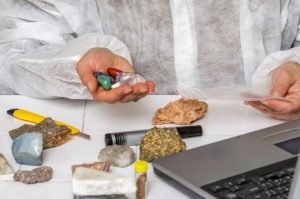
Geologist Tips
So, he’s a good model for aspiring geologists interested in a long and relatively successful career: Try to move to where the work opportunities are, and if you can’t afford to, then be where the opportunity to network will lead to work.
- Get Field Experience: Fieldwork is the cornerstone of a geologist’s education. Seize every opportunity to participate in field trips, internships, or volunteer opportunities that will give you experience in geological field work and data collection.
- Consider Specified Courses: Given the tight competition for the fossil record, you might want to consider specified courses in a particular area of geology (petroleum geology – oil and gas; environmental geology – mineral resources and environmental consulting; hydrogeology – groundwater resources). These initial employment options will increase your chances of getting a job and earning more money.
- Gain Technical Competence: Learn online, in the classroom, or by combining both. Become proficient with the technical tools of the trade, such as GIS, GPS, computer modelling programs, and other software in high demand. This will make you a more competitive candidate for geology jobs.
- Build Your Network: Go to conferences, join industry-related professional organisations, and network with other geologists. Joining networks of geologists who share your interests can help you get information about jobs, find collaborators, and learn about the latest developments in geology.
- Keep up with the news: To become a geologist, you are often involved in projects related to environmental sustainability, resource management and climate change. Staying informed about global environmental challenges and pressures will help you understand your work in the context of a wider world and how geology can contribute to the solutions.
- Advanced Education: A master’s degree or PhD is typically required if you want to specialise in a particular geology field. More career opportunities are available with an advanced degree, specifically in research, academia, and in more senior positions in industry (for example, at the mine site, in an oil and gas field, or an environmental consulting firm). A master’s degree or PhD will increase your wage and your expertise.
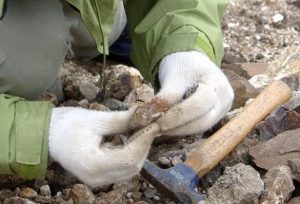
Geologist Requirements
To become a geologist, you are generally expected to have completed a degree and have some practical experience in the field. Here is what it usually takes to become a geologist in the UK.
- Job Qualifications: To become a geologist, you must have at least a bachelor’s degree in geology or a related subject—such as Earth science, environmental science, or geophysics—to work. Many UK universities offer degree programmes in geology or Earth sciences.
- Postgraduate Education (Optional): Although a bachelor’s degree can qualify you for entry-level employment, many aspiring geologists continue to graduate school to specialise in petroleum, hydrogeology, or environmental geology. A postgraduate degree can offer geologists a deeper level of knowledge and the possibility of more senior employment opportunities.
- Professional accreditation: In the UK, people can become professionally recognised by the Geological Society of London, which awards Chartered Geologist (CGeol) and Chartered Scientist (CSci) titles that can enhance your credentials and give you more options for work.
- Field Experience: Field experience will be required. Many geology degree programmes involve a field trip or research project, and you can gain experience by interning, volunteering, or working on geological research projects.
- Technical Skills: Most geologists need to be proficient in using geological equipment – especially GIS (Geographic Information Systems), GPS (Global Positioning System) and modelling software. Many employers expect candidates to have good technical skills, especially in posts related to exploration, research and environmental consultancy.
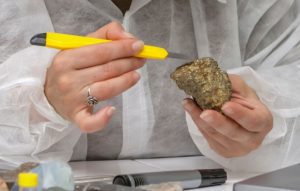
How to Become a Geologist
To become a geologist, you study the Earth, its origin and processes, and the lifeforms that inhabit it. At the same time, this may sound like a straightforward task, but becoming a geologist requires years of study, fieldwork, and, occasionally, some luck. But where do you begin? Here’s a step-by-step guide on how to become a geologist:
- Get a BA in Geology: Start by getting a bachelor’s degree in geology, Earth sciences or a related field. Choose a degree program that includes an equal number of courses involving classroom study and fieldwork. A geology degree generally includes courses in mineralogy, sedimentology, palaeontology and structural geology.
- Get some fieldwork experience: Besides coursework, make the most of fieldwork opportunities, internships and research experience during your degree programme. This is essential for building the skills and seeing critical geological processes for an earth scientist’s toolkit.
- Think about Postgraduate Education: if you want to focus on a specialised geology subfield or are interested in research jobs, consider getting a master’s degree or PhD. Postgraduate studies enable you to specialise in hydrogeology, petroleum geology, or environmental geology, and they can help you get hired into higher-level jobs in the industry.
- Professional membership: Join a professional body – a great way to network, get access to industry resources, and keep up-to-date with sector developments is to join a professional body such as the Geological Society of London. Membership in the Society is a requirement for those who want to take it a step further and achieve Chartered Geologist (CGeol) status.
- Gain Technical Competence: Learn to use geological field equipment and software. This includes GIS programs, GPS receivers and data loggers, computer-based modelling software, and more.
- Fieldwork: To become a geologist, you spend a lot of time in the field, so being outside and physically fit is essential.
- Get a Job: With experience in the field and your degree, it’s time to apply for jobs in environmental consulting, mining, oil and gas exploration, or research companies. Most geologists start their careers in junior roles and gain experience working on various projects.
- Ensure further Professional Development: Geology is an ever-evolving field, and it is necessary to keep up to date with new techniques, discoveries and environmental issues. Continue your education by taking courses, attending conventions, and actively participating in professional organisations.
Frequently Asked Questions
Why Should You Become a Geologist?
Being a geologist means combining science and a love of the natural world. It is a fulfilling career, providing opportunities for exploration of the Earth’s processes and contributing to its environmental sustainability with applications as diverse as natural resource exploration to ecological conservation.
Is Being a Geologist a Good Career Choice for You?
If you like working outside, you’re interested in the Earth sciences, and you are interested in helping resolve real-world problems concerning natural resources and environmental challenges, geology might be an excellent career for you. It’s a good fit for people who enjoy research, data analysis, and fieldwork.
Geologist Salaries
Salaries for geologists in the UK depend on the type of industry, level of experience, and the sector. A starting geologist can get anywhere between £22,000 and £30,000 a year; a senior geologist with vast experience in the field could earn up to £70,000 or more, particularly those who specialise in the oil and gas exploration business.
Which Qualifications Can Help with a Career as a Geologist?
You’ll need a bachelor’s degree to work as a geologist, with a master’s degree or PhD required for more senior positions or research jobs. With more hours in the field and less time in an office, it’s also a good idea to gain extra qualifications, such as the professional certifications awarded by organisations like the Geological Society of London, which offers the Chartered Geologist (CGeol) status.
Do I Need Experience to Get Started as a Geologist?
Yes, practical field experience is significant in a geology career. Most degree courses include trips to the field and a research project (or dissertation) with a fieldwork component. Internships and volunteer work are also great ways to gain experience in the field. Many employers require at least some field experience for entry-level geology careers.
Geologist Career Outlook
There is still a demand for geologists in the UK, especially in environmental consulting, mining and oil and gas exploration. There are also increasing opportunities for geologists in ecological and conservation work.
Geologist Hierarchy and Progressing Within the Role
Geologists start their careers as field assistants or junior geologists before being promoted to senior geologists, project geologists or team leaders. After additional experience and education, geologists may move into managerial roles (geological managers) or become research directors.
Geologist Exit Options and Opportunities
Most geologists move into other closely related disciplines, such as environmental consultancy, natural resource management or education. Some may move into other leadership positions within the geologist’s industries (for example, a director or consultant). In contrast, senior and qualified geologists may move into teaching or research-based roles in science.


